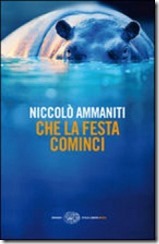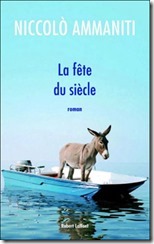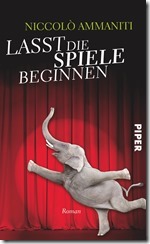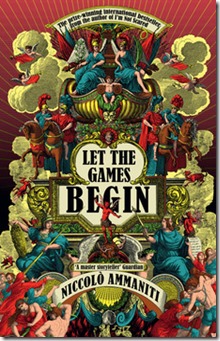There was no plan B. And plan A leaked water all over the place. – Niccolò Ammaniti, Let the Games Begin
For a very Italian novel—l'Unità said that “Let the Games Begin may well be the print version of La Dolce Vita set today”—there was something, for me, oddly British about this book; we readers do bring our own baggage. I grew up with the term ‘French farce’ but look up ‘farce’ in Wikipedia and you’ll actually find more British farces listed than French and those are the ones I remember. Let the Games Begin is an Italian farce—I’ll have more to say about that in a minute—but it reminded me of so many British sitcoms and sex comedies from the sixties and seventies. Wikipedia defines a farce as follows:
In theatre, a farce is a comedy that aims at entertaining the audience through situations that are highly exaggerated, extravagant, and thus improbable. Farces are often highly incomprehensible plot-wise (due to the large number of plot twists and random events that often occur), but viewers are encouraged not to try to follow the plot in order to avoid becoming confused and overwhelmed. Farce is also characterized by physical humour, the use of deliberate absurdity or nonsense, and broadly stylized performances. […] Furthermore, a farce is also often set in one particular location, where all events occur.
That pretty much defines this book, what’s good about it and what’s bad. The blurb on the back of the book states quite plainly:
WARNING!
contains
SATANIC CULTS
INTOXICATED SUPERMODELS
OLYMPIC ATHLETES
and
MAN-EATING HIPPOS
 I actually missed the hippos but I did catch the elephants, the tigers, the foxes, gnus, horses, zebra, giraffes, gazelles, camels, African wild dogs, crocodiles—they definitely ate someone—and herds of buffalo. So maybe I can be forgiven; there was a lot going on.
I actually missed the hippos but I did catch the elephants, the tigers, the foxes, gnus, horses, zebra, giraffes, gazelles, camels, African wild dogs, crocodiles—they definitely ate someone—and herds of buffalo. So maybe I can be forgiven; there was a lot going on.
As is so common in sitcoms we have two interweaving narrative threads and my first thought after reading the opening two chapters was: How the hell is he going to tie these two together? But Brautigan handled it brilliantly in Willard and his Bowling Trophies and Ammaniti manages it here and with aplomb. As soon as I read there was going to be a party I realised this was going to be the cauldron in which everyone’s goose would eventually be cooked. (No, there are no geese in the book but there is a headless chicken as well as numerous chicken dishes.)
In a sitcom one of the stories is usually the subplot but really these two stories stand on an equal footing. The first concerns Mantos, Murder, Zombie and Silvietta, otherwise known as the Wilde Beasts of Abaddon. If Jimmy Perry and David Croft had decided to write a show about a hapless Satanic cult they could’ve done worse that choosing these four. When we’re first introduced to them—holding a meeting in a local pizzeria—this is how they’re described:
Mantos (a.k.a. Saverio Moneta) was “[s]kinny, five-foot six, with metal-framed glasses, he wore his hair parted on the left. He was wearing a short-sleeved, light blue shirt buttoned right up to the throat, dark blue cords and a pair of slip-on moccasins.” Saverio, when he wasn’t being Mantos, was the department manager of the Furniture Store of the Master of the Axe. He works for his tyrannical father-in-law.
Murder (a.k.a. Roberto Morsillo) was “[a] chubby guy almost six foot six, with long dyed-black hair and glasses covered in oily fingerprints. He wore a stretched Slayer t-shirt. Originally from Sutri, he was studying Law at Rome University and worked at the Brico DIY centre in Vetralla.”
Silvietta (a.k.a. Silvia Butti) was “the group’s Vestal. A scrawny redhead with bug-eyes sticking out beneath thin eyebrows that sat too high on her forehead. She wore a silver ring in one nostril and another in the middle of her lip.” She and Murder had been dating when Mantos suggested sacrificing her to Satan. The veracity of her virginity was questionable—despite the fact Murder swore they’d done everything bar having sex—but in the end the group decided that “the purity of the victim was not a substantial problem.”
Zombie (a.k.a. Edoardo Sambreddero) was “a haggard-looking guy, who suffered from congenital esophagitis: couldn’t swallow garlic, chocolate or fizzy drinks. He worked for his father assembling electrical systems in Manziana.” He and Murder are best friends. He’s also secretly in love with Silvietta.
The meeting has been arranged because, well, they’re really not much of Satanic cult. And they know it. Zombie cuts to the chase:
‘Technically,’ he said, ‘we, as a sect, don’t exist.’
Saverio has guessed what he was up to, but pretended not to understand.
‘What do you mean?’
‘How long’s it been since we took the bloody oath?’
Saverio shrugged his shoulders. ‘It’s been a few years.’
‘They never talk about us online. But they talk plenty about the Children of the Apocalypse,’ whispered Silvietta so softly that nobody heard her.
Zombie pointed a grissino at his chief. ‘In all this time, what have we accomplished?’
‘All those things that you promised … How many of them have we done?’ Murder chimed in. ‘You said we’d make loads of human sacrifices, but we haven’t seen hide nor hair of them. And what about the initiation ritual with the virgins? And the Satanic orgies?’
 To be fair they had tried to sacrifice Silvietta the year before but that clearly hadn’t worked out despite the fact they buried her alive. But at least they’d tried. And that had bought Saverio time but now his time is up. He has to come up with something awesome to rally the troops. But what? He asks for a week to come up with something worthy but the bottom line is he hasn’t a clue.
To be fair they had tried to sacrifice Silvietta the year before but that clearly hadn’t worked out despite the fact they buried her alive. But at least they’d tried. And that had bought Saverio time but now his time is up. He has to come up with something awesome to rally the troops. But what? He asks for a week to come up with something worthy but the bottom line is he hasn’t a clue.
The second storyline couldn’t be more different. About fifty kilometres from the pizzeria we’re introduced to the novelist Fabrizio Ciba. He’s rich and famous but his reputation rests mainly on one book, a one hundred and twenty page novella entitled The Lion’s Den:
Fabrizio Ciba was forty-one years old, but everyone thought of him as [a] younger writer. That adjective, frequently repeated by the newspapers and other media, had a psychosomatic effect on his body. Fabrizio didn’t look any older than thirty-five. He was slim and toned without going to the gym. He got drunk every evening, but his stomach was still as flat as a table.
It’s been five years since The Lion’s Den and no one has had anything much to say about his follow-up, Nestor’s Dream. He’s been living off both the profits and the goodwill generated from The Lion’s Den for long enough and desperately needs something to make the critics sit up:
Fabrizio knew he was capable of writing THE GREAT NOVEL. What’s more, THE GREAT ITALIAN NOVEL, like I promessi sposi to be exact, the book critics said was missing in our contemporary literature. And after various attempts, he had begun working on a Saga about a Sardinian family, from the seventeenth century until the present day. An ambitious project that was definitely much stronger than Gattopardo or I Viceré.
Needless to say he is also at an impasse; in that respect he’s a total cliché: the blocked writer.
In an October 2009 interview in Corriere della Sera, Ammaniti, who won international acclaim for his novel I’m Not Scared, explained that most of his approach to Ciba was “teasing, playing with stereotypes … [Ciba] represents a little Mr. Hyde in me.” – Charlotte Bhaskar, ‘The Dark Denizens of a Debauched Rome: Niccolo Ammaniti’s Let the Games Begin’, Zyzzyva, 17 July 2013
So much like the Wilde Beasts of Abaddon he’s looking for something to kick start his future. As it happens it’s a party, a party that promises to be the most lavish OTT party that Rome has ever seen, since at least Caligula anyway. His host has converted the grandest public park in Rome, Villa Ada, into his personal safari range and the party promises to deliver debauchery of every sort—feasting (the twelve-decker Club Sandwich Ambassador Grand Royal stuffed full with sixty-five different ingredients says it all), fornicating (not part of the official schedule but far from frowned upon) and hunting (foxes, lions, and an admittedly ailing albino Bengal tiger so think of it as a mercy-killing). Fabrizio, of course, is going as an honoured guest although to be fair there are so many honoured guests he’s unlikely to stand out and for a while is actually in two minds whether or not to go —people have been talking about this party for a year—whereas the Beasts are going to have to wangle their way in among the catering staff in order to exact the plan their leader will hatch in chapter 11.
That plan has nothing to do with Fabrizio Ciba. They have no idea who he is. They’re not big readers.
Farce, of course, is not simply the province of the French and the British but when you think about Italian theatre, what’s the first thing that jumps to mind? The commedia dell'arte! Although it’s hard to establish a clear thread some suggest a connection between the commedia dell'arte and the Atellan Farces which were a collection of vulgar farces, containing lots of low or buffoonish comedy and rude jokes. It was very popular in Ancient Rome.
The commedia dell'arte is a form of theatre characterized by masked "types" which began in Italy in the 16th century and was responsible for the advent of the actress and improvised performances based on sketches or scenarios.
[…]
The characters of the commedia usually represent fixed social types, stock characters, such as foolish old men, devious servants, or military officers full of false bravado. Characters such as Pantalone, the miserly Venetian merchant; Dottore Gratiano, the pedant from Bologna; or Arlecchino, the mischievous servant from Bergamo, began as satires on Italian "types" and became the archetypes of many of the favourite characters of 17th- and 18th-century European theatre. – Wikipedia
Ciba, the blocked writer, is far from being the only stereotype in this book. They’re crawling out of the woodwork.
 Satire and farce don’t tend to mix well—farce tends towards the lowbrow (slapstick, fart jokes and gross-out humour), satire is generally more intellectual employing techniques like irony, parody and sarcasm—but I think Let the Games Begin manages to combine the two as well as could ever be done. The party around which the majority of the action in this book takes place isn’t a masque in the traditional sense but this is high society and everyone wears a mask. The Beasts wear their own masks. Most of their days they’re indistinguishable from the rest of us. That underneath their ordinariness there lie bumbling servants of the Devil is neither here nor there. Who’s to say what lies underneath Fabrizio Ciba’s mask or that of his host, the megalomaniacal property tycoon Sasà Chiatti, or the singer Larita (a.k.a. Elsa Martelli) who Fabrizio falls for and who, we learn, is to be the Beasts’ target? Why her? She was once a death metal diva, the lead singer of Lord of the Flies, and as such something of a poster child to the Beasts, but as she’d recently abandoned her roots, converted to Catholicism and reinvented herself as a pop princess putting her name to such albums as Live in Saint Peter and Unplugged in Lourdes, she was now hated by all Satanists and fair game. Once the Beasts learn she’d going to be attending the party it’s obvious what needs to be done. Just as well DHL had just delivered a replica of the Durendal, a “faithful reproduction of the sword of Roland, Charlemagne’s paladin”. That would do the job nicely. All I want to say at this point is: Watch what you buy on eBay.
Satire and farce don’t tend to mix well—farce tends towards the lowbrow (slapstick, fart jokes and gross-out humour), satire is generally more intellectual employing techniques like irony, parody and sarcasm—but I think Let the Games Begin manages to combine the two as well as could ever be done. The party around which the majority of the action in this book takes place isn’t a masque in the traditional sense but this is high society and everyone wears a mask. The Beasts wear their own masks. Most of their days they’re indistinguishable from the rest of us. That underneath their ordinariness there lie bumbling servants of the Devil is neither here nor there. Who’s to say what lies underneath Fabrizio Ciba’s mask or that of his host, the megalomaniacal property tycoon Sasà Chiatti, or the singer Larita (a.k.a. Elsa Martelli) who Fabrizio falls for and who, we learn, is to be the Beasts’ target? Why her? She was once a death metal diva, the lead singer of Lord of the Flies, and as such something of a poster child to the Beasts, but as she’d recently abandoned her roots, converted to Catholicism and reinvented herself as a pop princess putting her name to such albums as Live in Saint Peter and Unplugged in Lourdes, she was now hated by all Satanists and fair game. Once the Beasts learn she’d going to be attending the party it’s obvious what needs to be done. Just as well DHL had just delivered a replica of the Durendal, a “faithful reproduction of the sword of Roland, Charlemagne’s paladin”. That would do the job nicely. All I want to say at this point is: Watch what you buy on eBay.
There are too many characters in this book for every one of them to be fleshed out but the main ones are and here’s the thing: rather than develop an affinity for the writer—bit o’ solidarity there Murdoch—I actually started to find I’d more time for the Satanists. You see once you scrape away the grease paint the Beasts are actually quite a decent bunch of people who simply haven’t grown up whereas most of the guests aren’t, not deep down and most aren’t that deep. It’s what worked so well with The Addams Family. When push comes to shove Mantos does the decent thing and Fabrizio lets the side down—twice in fact.
This is an impossible book to try and summarise. It’s not even that long—328 pages—but an awful lot happens in them some of which is actually quite awful and we wonder why we’re laughing. It really is organised chaos, so much so that you will forgive me for forgetting what happened with the pod of hippos. I was probably too upset about the elephant and the tiger hunt. Seriously this is the party to end all parties. Nothing Gatsby ever threw could come close to the extravagance of this thing. The book is apparently (in part at least) a criticism of the vanities of the Berlusconi era. The newspapers describe his soirees as “bunga bunga parties”; he (at least publicly) preferred to call them “elegant dinners”. In June of this year things came to a head:
A Milan court sentenced Berlusconi on Monday to seven years in jail and banned him from public office after convicting him of paying for sex with a minor and of abuse of office. He will remain free pending the outcome of his appeals, expected to take several years to resolve.
Prosecutors have presented evidence describing unbridled scenes involving young women stripping and performing raunchy dances at Berlusconi's parties and being rewarded with envelopes stuffed with thousands of euros in cash. – Reuters, 28 June 2013
As I know even less about Italian politics than I know about British politics—that would be nothing compared to next-to-nothing—I can only relay what other reviewers have said.
In the midst of all the pandemonium that ensues—especially after Zombie cuts the electricity—and all semblance of civility goes out of the window—the Lord of the Flies reference is there for a reason—what we end up with is a face-off (of sorts—I can’t really go into the details) between two contrasting-and-yet-at-the-same-time-quite-similar characters: Mantos is married, henpecked (although that’s putting it mildly) by his wife, bullied by her father, struggling financially and unbearably ordinary; Fabrizio is single, successful with women, rich and very much the golden boy of Italian literature: the masks are off. Both want to escape from something in their lives which, interestingly enough, they both wind up doing and it’s all because of this party. They’re not really doppelgängers but there is a connection: there but for the grace of … God or the Devil—take your pick.
The book has its faults. Some of the descriptions are a bit heavy-handed and the short chapters mean you’re continually flipping from one storyline to the next and back. It all adds to the general feeling of disorientation though. Remember what Wikipedia said about a farce—“viewers are encouraged not to try to follow the plot in order to avoid becoming confused and overwhelmed”—well the same goes for readers here and, yet, to be fair, I picked up on all major plot points throughout the reading; it was really the background clutter that went out of focus from time to time which is how I managed to miss the hippos. The book’s funny, although you really need a dark sense of humour to appreciate much of it, and it’s tragic, too; in fact tragedy wins out at the end despite the happyish ending. It’s not a book I would’ve bought and since I was hoping for something more like Me and You—which I read recently and enjoyed—I was a bit disappointed by this one but that’s not the author’s fault. I much preferred Peter Sellers in Being There to Peter Sellers in The Party: horses for courses.
Oh, I forgot about the Olympic Athletes. Did you know that the Olympics were held in Rome in 1960? Well, apparently not all the Russians made it home and you don’t want to know where they were living.
***
 Niccolò Ammaniti was born in Rome in 1966. He has written two collections of short stories and six novels, four of which have been translated into English. His second novel, Steal You Away, was long listed for The Independent Foreign Fiction Prize. He was the youngest ever winner of the Italian Viareggio Literary Prize for Fiction for his best-selling novel I'm Not Scared, which has been translated into thirty-five languages. As God Commands received the prestigious Premio Strega Prize in 2007, and his novel Me and You (which I review here) was made into a feature film by Bernardo Bertolucci.
Niccolò Ammaniti was born in Rome in 1966. He has written two collections of short stories and six novels, four of which have been translated into English. His second novel, Steal You Away, was long listed for The Independent Foreign Fiction Prize. He was the youngest ever winner of the Italian Viareggio Literary Prize for Fiction for his best-selling novel I'm Not Scared, which has been translated into thirty-five languages. As God Commands received the prestigious Premio Strega Prize in 2007, and his novel Me and You (which I review here) was made into a feature film by Bernardo Bertolucci.
The translator, Kylee Doust, studied Italian literature and linguistics at La Trobe University, Melbourne. She has lived in Italy since 1998.




No comments:
Post a Comment